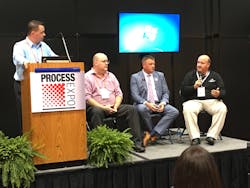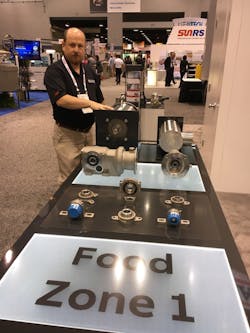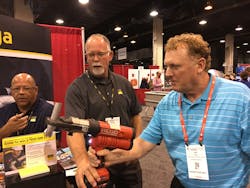Process Expo 2017 — key takeaways and notable happenings
Last month I attended Process Expo 2017 in Chicago, for what was the largest gathering of food processing industry professionals in the show’s history. With nearly 14,000 attendees exploring a sold-out show floor featuring more than 500 exhibits, the 2017 iteration of the Process Expo was a lively event offering a range of interactive learning opportunities, including production line demonstrations, a virtual reality showroom, meetups and educational sessions.
IIoT and food safety earn hot-button status at Process Expo 2017
Among the more notable presentations I sat in on during my time at Process Expo was a session by Advanced Technology Services’ Chris Lebeau, titled "The Path to IIoT: Effective Change Management Tips." During his presentation, Lebeau brought to light what he sees as the seven pitfalls that typically derail IIoT projects before they gain traction:
- Insufficient project management
- Failure to get buy-in within the organization
- Inability to update components crucial to the process
- Vendor risk
- No "Plan B"/exit strategy
- Security and privacy factors
- Focus on technology over the business case
"Just because you can monitor something doesn’t mean you should," said Lebeau. In the end, he said food processors are best served when operation technology (OT) stakeholders are communicating and collaborating with information technology (IT) and business stakeholders to answer what he described as the fundamental IIoT question: "If this machine could tell you anything, what would you want it to tell you?"
Food processors are best served when operation technology (OT) stakeholders are communicating and collaborating with information technology (IT) and business stakeholders to answer the fundamental IIoT question: "If this machine could tell you anything, what would you want it to tell you?"
Process Expo also featured a variety of sessions about food safety. During a roundtable discussion moderated by The National Provisioner’s Andy Hanacek, panelists discussed the myriad of food-safety issues and challenges that keep meat and poultry processors up at night. And while the panelists said the local food and farm-to-table movements have been a huge win for food processors in general and have opened up opportunities for new businesses to enter the market, food safety regulations continue to present challenges for the industry.
"Regulatory uncertainty will put more small processors out of business in the near term than anything else," one panelist said.
During a roundtable discussion moderated by The National Provisioner’s Andy Hanacek, panelists discussed the myriad of food-safety issues and challenges that keep meat and poultry processors up at night.
All of the panelist participating in the roundtable discussion agreed that food safety regulations have become somewhat unpredictable, leaving food processors uncertain of what they need to do to maintain compliance. The panelists said regulators seem to have lost focus on what food safety is, and inspectors are asking for tasks that are unnecessary and are moving away from the basic tenants of food safety. They all agreed there are too many layers of requirements that aren’t adding value or safety to the product and, at the same time, preventing many small-to-medium food processors from effectively competing in the marketplace.
Key food processing markets forecast healthy growth
During a press briefing at Process Expo, David Seckman, president of the Food Processing Suppliers Association (FPSA) provided insight on three global forecast reports on the state of the meat processing equipment, poultry processing equipment and pet food processing equipment markets over the next several years.
The global meat processing equipment market, valued at U.S. $9,075.1 million in 2015, is projected to reach U.S. $14.5 billion by 2022, at a compound annual growth rate (CAGR) of 7.03 percent during the forecast period, according to the FPSA. Factors responsible for driving growth of the industry are the increased consumption of processed food, government support for equipment use in developing countries, demand for food safety and safety of workers, presence of small and medium enterprises in developing countries, rising raw material costs, and international trade rules.
The global poultry processing equipment market was valued at U.S. $2.95 billion in 2014, and is projected to reach U.S. $3.83 billion by 2020, at a CAGR of 4.7 percent during the forecast period. Factors responsible for driving the growth of the industry are the increased consumption of processed food, the government support for the use of equipment in developing countries, the demand for food safety, safety of workers, the presence of small and medium enterprises in developing countries, rising raw material costs and international trade rules.
The pet food processing equipment market is projected to grow at a CAGR of 3.5 percent in the next six years to reach a market of U.S. $4.27 billion by 2022. The growth of the pet food processing equipment market is attributed to the increase in the global demand for pet food supplies, especially in growing economies such as China, Brazil, Argentina and India, owing to a growing urbanization that has stimulated a desire to keep pets and has resulted in the increasing usage of processed pet food products; and advancements in the manufacturing processes and technologies.
Recognizing food processing innovation
Process Expo also featured an Innovation Awards program recognizing innovative, cutting-edge technology and equipment based on feedback from a panel of judges from the food processing industries. Innovation Awards winners included:
- Bakery, Grains, Seeds and Snacks: Brimrose Corporation of America, Luminar 4070 AOTF-NIR process analyzer
- Meat, Poultry and Seafood: Zubex USA LLC, ZUBIOX biodegradable cooking casings and shrink vacuum bags
- Pet Foods: Remco Products Corporation, color-coded lobby dustpan and broom set
- Prepared Foods: Multivac Inc., Portion Pack with Snapsil opening feature
- Beverage: RGF Environmental Group Inc., IMSB ice machine sanitizer
- Confectionery, Candy and Sweets: Banner-Day, TraceFREE electric impedance pipe heating
- Dairy: Powder-Solutions Inc., MAGNATTACK MAG-RAM self-cleaning magnet
The People’s Choice Award, selected by Process Expo attendees out of the 21 Innovation Showcase nominees, was Blentech Corporation’s CookerCloud, a cloud-based historian that remotely monitors and collects secure data from food and beverage operations.
FPSA inks mutual cooperation agreement with IFFA
During day two of Process Expo, FPSA signed an agreement of mutual cooperation with Messe Frankfurt, owner of the IFFA trade show, in support of both organizations’ conferences. This is the latest of several agreements FPSA has signed in recent years with organizers of similar international trade shows representing the food and beverage industry. Through such agreements, Process Expo expects to strengthen its ability to meet and service the needs of show attendees and exhibitors in the food processing and packaging arena.
Women’s Council presents keynote address
The Process Expo is presented by the Food Processing Suppliers Association. The FPSA’s newest initiative, the FPSA Women’s Council, held a leadership breakfast with a keynote presentation from Jane Grote Abell, board chair and member of the founding family of Donatos Pizza.
The Women’s Council aims to facilitate positive transformation for women in the food and beverage industry and to empower its members to achieve both professional and personal growth.
FFPSA announces $100,000 donation to fight hunger
The Foundation of the Food Processing Suppliers Association (FFPSA) presented a donation of $100,000 to the Greater Chicago Food Depository at a press conference during Process Expo. The donation, a result of the FFPSA Defeat Hunger campaign, included food products donated by Process Expo exhibitors and money raised through virtual donations, is the equivalent of 400,000 meals, and will be used to help fight hunger in the Chicago area.
Other notable announcements
Baldor Electric showcases new food-safe stainless steel motor platform
Baldor’s Reliance Food Safe Motors were on display at Process Expo. The motors are designed with smooth contours and advanced sealing, exceeding IP69K for water, to maximize motor life in high-pressure, sanitary cleaning environments. The high ingress protection-rated enclosures, offer fully encapsulated windings, effectively sealing the motor inside and out. Combined with a laser-marked nameplate and a footless mounting design, crevices are kept to a minimum and allow the motor to withstand clean-in-place procedures.
Baldor’s Reliance Food Safe Motors on display at Process Expo 2017.
Worker safety is another important component of Baldor’s food safe stainless steel motor design. A three-piece rotatable conduit box allows workers easier access to route incoming power supplies. Color-coded leads also help to quickly and correctly tie the motor into the electrical system using the waterproof heat shrink connectors. On larger frame sizes, lift lugs are fully welded to the frame for easy motor placement before attaching to the driven equipment.
Viega demos new line of MegaPress Stainless press fittings
Viega’s new MegaPress Stainless steel piping systems are designed for industrial applications where sanitary requirements are of concern. The system eliminates the need to shut down production for pipe maintenance. Using a specially designed tool and press jaws, one person can quickly and easily make MegaPress Stainless connections in seven seconds or less, according to Viega. The company says its unique press fitting system reduces installation time by 50 to 90 percent over traditional fitting processes, dramatically reducing the potential for downtime and lost revenue.
Viega demos its MegaPress Stainless press fittings at Process Expo 2017.
Two FPSA members celebrate 100-year anniversary
G.J. Olney and SPX Flow celebrated their 100-year anniversary of membership in the FPSA.
In 1915, "The Olney Mixer" became the company’s first patented invention for scientific preparation of vegetables for the Filling Machine. The unit measured proportionately corn, beans and syrup while also mixing and preheating the mixture. In 1920, the Olney Washer was added to the product line and soon after there would be other improvements, ideas and operations would continue to grow. Today, Olney equipment is used in processing lines in such diverse areas as Japan, New Zealand, Eastern Europe, Western Europe, Russia, Australia, England, South America, South Africa, as well as throughout the U.S. and Canada. Products processed with this equipment include peas, beans, corn, lima beans, dry beans, tomatoes, carrots, potatoes and various other vegetables.
While G.J. Olney was building the foundation of its business in the vegetable industry, Cherry-Burrell, which would ultimately become SPX Flow, was busy developing cutting-edge technology for the dairy industry.
Based in Charlotte, North Carolina, SPX Flow is a global multiindustry manufacturing company with approximately $2.5 billion in annual revenue, operations in more than 35 countries and over 8,000 employees. The company’s highly specialized, engineered products and innovative technologies are helping to meet rising global demand for electricity and processed foods and beverages, particularly in emerging markets.
Matt Migliore is director of content strategy for the Process Flow Network. He has covered technology and industry for 15 years. He can be reached at [email protected] or 484-255-9032.




